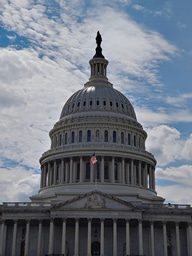Back to London for BX
Published in Social Sciences

Shortly after returning to London, I attended the Behavioural Exchange (BX) 2019 conference. The experience was very different from APSA, but just as satisfying. Whereas APSA is a massive conference involving thousands of researchers, three hotels, and a nearly 500-page conference program, BX is a much smaller affair, with roughly 1000 attendees. Whereas APSA involved a transatlantic flight, BX was just a trip on the tube to Westminster. And whereas APSA is primarily a research conference (though many outside academia do attend), BX has more mixed attendance in terms of employment.
The BX conference brings together academics, policy-makers and government officials, and workers in relevant industries to learn about and discuss behavioural science research. While there was an emphasis on “nudges” and efforts to shift behaviour through light-touch policies and programs, the conference was much broader than that, with panels on a range of behaviour change and evidence-based policy topics.
The conference began with a keynote by Cass Sunstein from Harvard Law School. From there, the days were filled with panels on a fascinating range of topics, including how to tackle disinformation, incentivizing healthy behaviour, replication and sound science, programs to reduce violence in cities, and many more. Although the topics were diverse, the panels shared some common themes. A central thread running through the conference was the desire to use scientific methods and evidence to implement, evaluate, and learn from programs and interventions aimed at improving individual and societal welfare. Of course, not all speakers reported on randomized controlled trials or focused on particular interventions. A second key theme of the conference was summarizing what we know about human thought and behaviour, and how we might learn more.
This desire to learn and do more fed into a positive energy and optimism that permeated the conference. Even outside of the panels, the conference experience was designed for energetic engagement and the exchange of ideas. The relatively small size of the conference and professional diversity of the delegates meant that there was ample opportunity to get the perspective of people working in different fields.
It was great to follow up the APSA experience with this visit to a smaller conference. I learned a lot from both and had a wonderful time interacting with researchers from around the world. Now that we’re in the last few days of 2019, I’m already looking forward to the exciting conferences ahead in 2020. I hope to see you there!
Follow the Topic
-
Nature Human Behaviour

Drawing from a broad spectrum of social, biological, health, and physical science disciplines, this journal publishes research of outstanding significance into any aspect of individual or collective human behaviour.

Please sign in or register for FREE
If you are a registered user on Research Communities by Springer Nature, please sign in